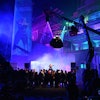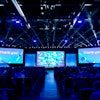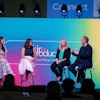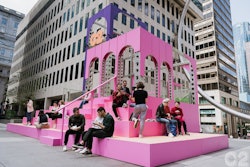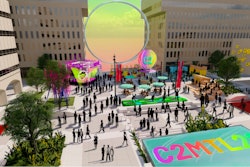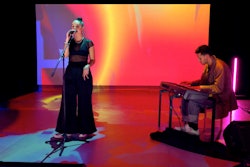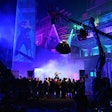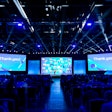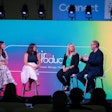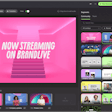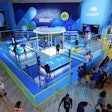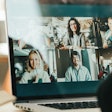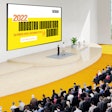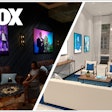
MONTREAL—C2 Montréal has long been considered one of the event industry's most innovative conferences, chock-full of innovative, effective ideas for creative networking and learning. While the international business event pivoted to virtual in 2020, this year's gathering—the 10th annual edition—took a multifaceted, hybrid approach, hosting attendees in person at Montreal performance complex TOHU as well as online via a custom-made virtual platform.
Unsurprisingly, C2 Montréal continued to inspire with its out-of-the-box event thinking and its creative approach to hybrid. Taking place Oct. 19-21, the conference stood out in part for its mix of speakers, which included business leaders from the likes of TikTok, Facebook and Pixar; actors like Mindy Kaling and Adrian Grenier; philanthropists like Olympic skier Lindsey Vonn and many more—some of whom joined the event virtually.
In person, other programming highlights included open-air (and COVID-safe) “net-walking” excursions, a puppy lounge designed to spark creativity, speed-coaching sessions and other activities designed to promote connections after so much time apart. Online, meanwhile, guests could access breakout rooms, engage in both spontaneous and preplanned networking opportunities and find other creative ways to interact with each other and the speakers. 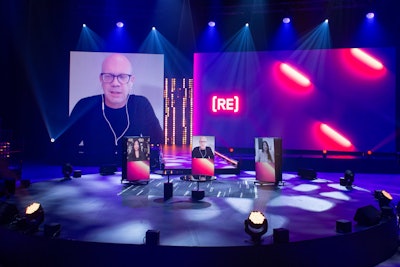 "Moving forward, the hybrid reality is one that we need to play in," said Cyboran.Photo: Courtesy of C2
"Moving forward, the hybrid reality is one that we need to play in," said Cyboran.Photo: Courtesy of C2
BizBash recently caught up with Julia Cyboran, C2 International’s vice president of content, marketing and audience. The Montreal-based executive discussed what it was like developing a custom virtual platform, what works and what doesn’t for hybrid networking, what she sees as the future of multiplatform events, the importance of showcasing diverse communities and much more.
This year’s conference had a [Re] theme—focusing on reconvening, reconnecting, reengaging, reimagining and renewing as a way to acknowledge the challenges of the pandemic. Why is it important to set a theme for each event?
For us, the theme acts as the north star for both the creative team and the content team. We're trying to create a red thread through the event to make sure the content we're sharing really addresses that theme, and that the creativity, the set design and the show design ladder back up to it. We take a very editorial approach to our work, and in things like TV shows and magazines, themes are often used to help highlight some pressing issues for the audience. That's what we feel the themes do for us. So it might be a little bit less common in the event space, but for us, it's really critical and helps us give more depth to what we're proposing to our participants every year.
C2 Montréal 2021 took place both in person at TOHU and on a custom virtual platform called C2Agora. Can you share how and why that platform was developed?
As with so many event organizers when the pandemic hit, we were completely destabilized. We were facing a very uncertain future. But we could always work with event tech, and we always had a very strong digital presence and created a lot of digital content, so we quickly put our heads together and decided we wanted to take this hybrid journey.
We started looking around at what types of technology were available, and we test-drove a few platforms that were out there, but very rapidly we realized that we needed to start building our own technology that would allow us to give our audiences exactly what they wanted from us. ... So the vision of Agora started at this point, where we realized that we wanted to be able to plug in some of the best-in-class technologies that were available to create a unique, online convening platform that would respond to a lot of those needs.
The C2Agora platform that was launched alongside the hybrid edition at C2 Montréal this year was definitely version one. We had social networking; we had contact exchange; we have a lot of those video-on-demand and content functionalities that we were looking for—but it definitely is a work in progress. We want to continue iterating and building on it, and when you're in that part of the technology business, you always have to be open to making sure you're pushing the build and responding to the ever-evolving needs of the participants. This year's C2 Montréal had a [Re] theme—focusing on reconvening, reconnecting, reengaging, reimagining and renewing as a way to acknowledge the challenges of the pandemic.Photo: Courtesy of C2
This year's C2 Montréal had a [Re] theme—focusing on reconvening, reconnecting, reengaging, reimagining and renewing as a way to acknowledge the challenges of the pandemic.Photo: Courtesy of C2
You’re planning to go hybrid again for next year's event, taking place Sept. 28-30, 2022. Do you foresee that being your model moving forward?
One of the things we realized is once the digital transformation hits an industry, it doesn't go back to the way it was before. And I think it's our responsibility to continue envisioning what a hybrid—or, I would even challenge it and call it a multiplatform—future looks like. Now that we know that these digital technologies exist and that they can break down barriers that previously existed—like price point or travel—it allows us to open up our events, our content and our networking capabilities to a broader audience. So that is not going to disappear as we move forward with C2 Montréal.
And we also know that people missed meeting in real life, bumping into someone serendipitously when they were ordering coffee. So for us, our vision at C2 moving forward is that a hybrid event reality is going to exist. What shape or form that's going to take in 2022 is definitely going to evolve from what we brought to market a few weeks ago with C2 Montréal. I think what we want to be able to do this year is to take the learnings from the event that we just finished producing and look at, ‘Okay, what worked? What didn't work? What was really sticky for the audience? What did they appreciate? What do we need to put more emphasis on, or less emphasis on?’ But moving forward, the hybrid reality is one that we need to play in.
The conference always draws an impressive group of speakers. In terms of speakers and programming, did you find that going hybrid allowed you to bring in people and ideas you hadn’t before?
A lot of our speakers were virtual. We’re based in Montreal, and there were lots of challenges in terms of travel—the border with the U.S. was open in one direction and not in the other, there were COVID testing regulations. There were challenges to bringing speakers in physically, and there were risks involved in that. So we took a conservative approach to booking a lot of our speakers.
Did having the hybrid experience make people more accessible? Not necessarily, because I think we've always been able to secure some pretty important speakers in person. I think, though, what it's giving us is the ability to be a little bit more flexible with their schedule, because a lot of these big-name speakers tend to have pretty busy agendas. One of the moments that really resonated with me was when we had Mindy Kaling broadcast on screen but had the interviewer live in the room—it really worked. And I think there's something about that that was a learning for us moving forward—sometimes the physicality was a barrier to getting some really great speakers.
So I think what it taught us was quite the opposite: It didn't necessarily open up more opportunities, but moving forward in the future, for people that we might not have solicited because of their geography and the complexity of getting into our country, there now is the opportunity for us to explore speaker shifts with them. In-person, organizers focused on creating environments that were COVID-safe (such as in outdoor settings around fire pits), but that also allowed attendees to have spontaneous connections and conversations.Photo: Courtesy of C2
In-person, organizers focused on creating environments that were COVID-safe (such as in outdoor settings around fire pits), but that also allowed attendees to have spontaneous connections and conversations.Photo: Courtesy of C2
A big part of C2 Montréal every year is the innovative networking and hands-on workshops. C2Agora aimed to recreate a lot of that, with spaces like a virtual networking area that all attendees could access. Is there anything you think really worked or didn’t work about the networking?
This year, we tried to make sure that the two experiences were able to respond to the benefits of each of the [formats]. So in person, we really made sure that, to the best of our abilities—because in Quebec there were still some pretty important COVID restrictions that we had to follow—the in-person networking was a lot more serendipitous. ... We really focused on making environments that were COVID-safe, but also allowed people to reconnect and have those in-person moments together. So it was actually quite lovely to see people who hadn't seen each other in almost two years sit down and have those conversations. We're known for our ability to simulate business conversations, and that's what happens on-site at C2 as well.
 In-person activities also included a puppy lounge and "net-walking" experiences (aka, networking while walking).Photo: Courtesy of C2
In-person activities also included a puppy lounge and "net-walking" experiences (aka, networking while walking).Photo: Courtesy of C2
But we're a little bit humbled in the sense that we're still coming out of the pandemic and we're re-flexing our muscles. And we're also learning how to work in a new reality. So was it exactly as we had envisioned it in the past? No, but I think we're now in the process of building new ways for people to network both online and in person.
C2 Montréal has always aimed to highlight and include people from diverse communities—a goal that was enhanced this year via a new, long-term philanthropic initiative to expand your attendance. Can you tell us about that?
For us, having diverse programming was always really important, and this year, we took a much more intentional approach to it. There's lots of stuff that has happened in the world since COVID started, with movements like Black Lives Matter, as well as the Truth and Reconciliation issues that have come up with our Indigenous people here in Canada. It really made it critically important for us as a brand that presents content to [acknowledge] that.
We also launched the C2² initiative this year, [which will work with donors to give young people from diverse backgrounds free access to C2 Montréal]. It's really, really important to our brand to make sure we democratize C2 a little bit more, that we walk the talk. So not only are we making sure there are diverse voices on our stage but that we’re also opening up C2 to newer generations, to people that might have had a barrier of access to our event—and also to intentionally make sure that we were getting business leaders, entrepreneurs, changemakers of all sorts from BIPOC communities, from LGBTQIA+ communities, from Indigenous communities. So through C2², we worked with a donor system that allowed us to find donors that would sponsor a number of participants from these various communities to come to C2.
And this is not a one-shot deal. This is something that's going to continue every year at C2 because what's important for us is that we look at starting progress in business—and a big part of that progress is advancing the ability for all these various communities to participate in the business world, to drive the economy, to change some of the things that we know are systematically wrong with our society. We're very enthusiastic about it; it's baby steps, and we need to be humble, and we need to work with various leaders from these communities to make sure we're representing people properly, because I'm very aware that I might exist with an unconscious bias from my privileged perspective.  A variety of large screens allowed in-person interviewers to chat with speakers who couldn't travel to Montreal for the event.Photo: Courtesy of C2
A variety of large screens allowed in-person interviewers to chat with speakers who couldn't travel to Montreal for the event.Photo: Courtesy of C2
You produced a fully virtual event in 2020 and now a successful hybrid event in 2021. Looking back, are there any lessons learned that you'll carry into the future?
One of the important things that we do really take to heart is the ability to continue taking risks and to continue trying to reinvent and push the envelope. In this time of transformation, we're trying things—we're trying to not adjust the model but to adapt the model to the new realities of where people are today versus where they were pre-pandemic. We want to make sure that what we're delivering them is something that inspires them, that helps them to network and connect to people, that helps them learn, that helps them discover new things.
And that's not going to stop. We have such an amazing team of wildly creative individuals in all different spheres—even our finance team is full of creatives! So it's all of us working together to make sure we listen to the participants and to our community, and understand what they need and expect from us and how we can continue delivering things that are going to surprise them, that are going to inspire them, that are going to help them move forward. [It's about] really focusing on these notions of progress, be it growth for businesses or progress for society. It might sound a bit lofty, but we do our best to do that.
